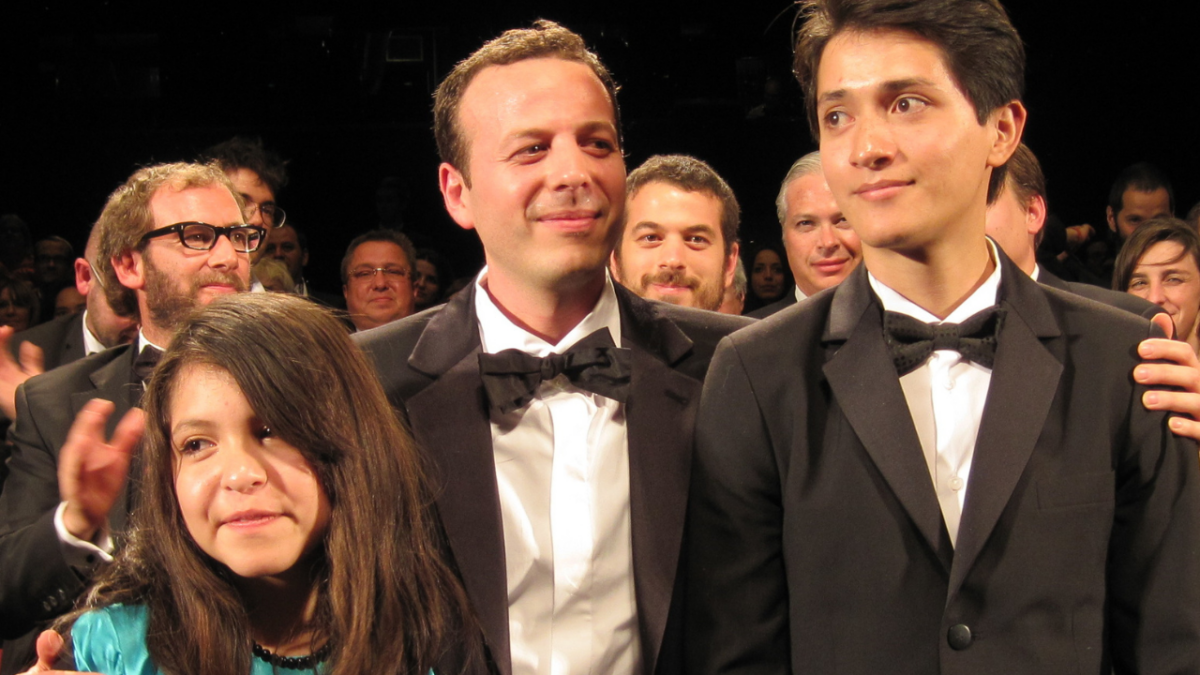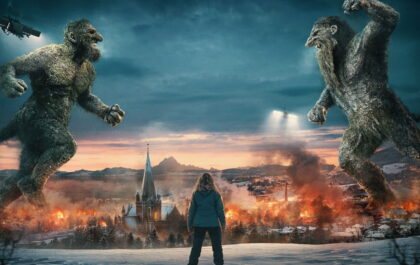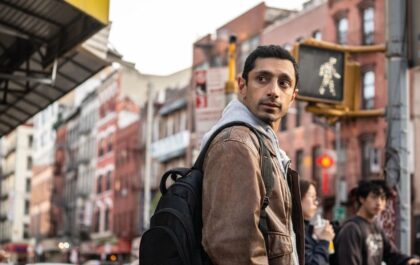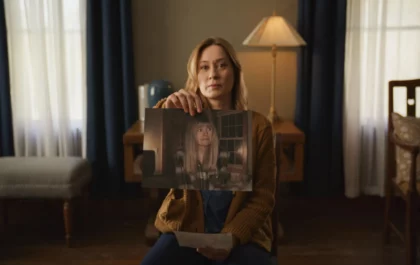Terwijl we in de loungekamer van het Thermae Palace naar de eindeloze golven van de Noordzee staren, kijken we tegelijkertijd ongeduldig op ons uurwerk. Dat is niet zo maar, want Fast Forward mag Amat Escalante ontvangen. De Mexicaanse filmmaker die de wereld in de ban hield met de Netflix-serie Narcos komt tijdens het Filmfestival van Oostende zijn nieuwste prent Perdidos En La Noche voorstellen. Een bikkelharde prent die niet bepaald het mooiste van Mexico toont. Of is het misschien onze perceptie en vinden we dit soort misdaden niet overal in de wereld?
Allereerst wil ik je feliciteren met de film, want ik was er erg door overdonderd. Als ik de film in één zin zou moeten beschrijven, zou ik zeggen dat het een thriller is over een man die op zoek is naar gerechtigheid.
Amat: Dat is het hoofdconcept, het zou een interessante oefening zijn om dat zelf eens te doen, mijn film in één zin samenvatten (lacht). Maar ja, dat is het basisidee. Natuurlijk is het meer dan dat, maar dat is de essentie denk ik. En dan zijn er nog andere dingen die ik interessant vond, zowel persoonlijk als sociaal. Je hebt natuurlijk het personage van de moeder, het schuldgevoel en de tegenstrijdigheden.
Je hebt een tijd in Mexico gewoond. Ik weet niet of de film gebaseerd is op ware gebeurtenissen, maar ik denk dat je veel jongens zoals Emiliano kent die lijden onder hetzelfde onrecht…
Amat: Ik ben opgegroeid in de staat Guanajuato, waar we de film hebben opgenomen. Ja, het is niet direct gebaseerd op een ware gebeurtenis, maar in mijn films gebruik ik altijd elementen die deel uitmaken van ons collectieve bewustzijn. En ik probeer het altijd op een bepaalde manier persoonlijk te maken. Ik probeer in het leven van de personages te kruipen en hun emoties en tegenstrijdigheden te voelen. Het leven is erg tegenstrijdig en het is nooit negatief of positief. Het is altijd iets dat er tussenin zit en hetzelfde geldt voor goed en kwaad. Weet je, geen enkel persoon is helemaal slecht of helemaal goed. Die tegenstellingen zijn iets wat ik leuk vind aan het leven en ik laat me graag inspireren door één plek.
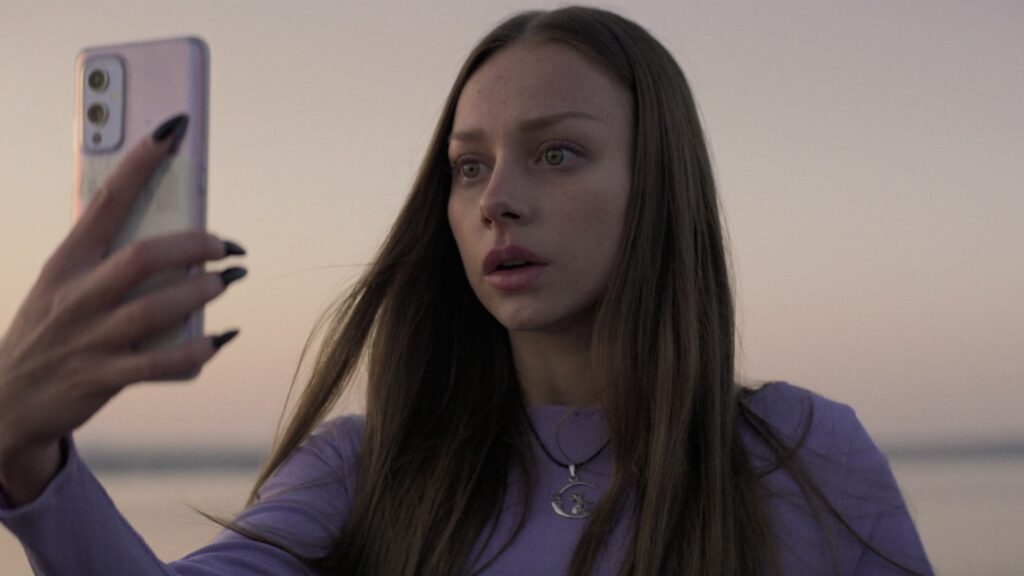
Al mijn films komen in zekere zin uit mijn geboorteplaats, zelfs als ik in de Verenigde Staten ga filmen. Los Basado, mijn tweede film, gaat over mensen uit Guanajuato. Het is een plek vol verhalen en anders dan de hele wereld eigenlijk. En het is een plaats met veel dingen die me interesseren en die te maken hebben met rechtvaardigheid en sociale ongelijkheid, die dingen zijn erg aanwezig in een land als Mexico. Soms is het moeilijk voor me om iets anders te vinden om over te spreken. En in Perdidos En La Noche probeerde ik andere dingen erbij te betrekken, onderwerpen als roem en beroemdheid. Wel meer het moderne type roem dat te maken heeft met het internet. Ik denk dat het heel sociaal is om te proberen niet-acteurs te hebben die zich in de situaties bevinden waarin ze leven. Zo was het met alle acteurs, zelfs met de echte acteurs die toevallig erg op de personages lijken.
Het is dan wel een perfect Hollywoodverhaal, maar vanaf het eerste moment breng je de kijker in een ongemakkelijke positie door een zin van Dostojevski over zelfmoord te gebruiken.
Amat: Normaal doe ik dit niet. Het is de eerste film waarin ik een citaat over iets gebruik. Ik schreef het scenario tijdens de pandemie toen iedereen thuis zat. Omdat ik in een klein stadje woon met vlakbij veel bergen, had ik een leuke routine om daar te wandelen. Tijdens deze tochten begon ik te luisteren naar heel wat romans die ik jaren genegeerd had, omdat ze erg moeilijk waren om ze te lezen. Helaas ben ik niet zo goed in lezen, maar ik luisterde naar de meeste romans van Dostojevski en ik werd er erg door geïnspireerd. Ik voelde me op mijn gemak om een uitdrukking te gebruiken die tegelijkertijd een soort ironie is en het gevoel van de film weergeeft. Als je leven iets waard lijkt, moet je geen zelfmoord plegen. Zelfmoord is iets dat steeds vaker voorkomt naarmate ik ouder word. Je begint te zien hoe goede vrienden en mensen die je kent zelfmoord plegen. Het is iets nieuws in mijn leven, maar ook iets engs en tegelijkertijd heel onzichtbaar, heel abstract en moeilijk te begrijpen, toch is het steeds meer aanwezig en ik denk dat het daarom ook in de film zit.
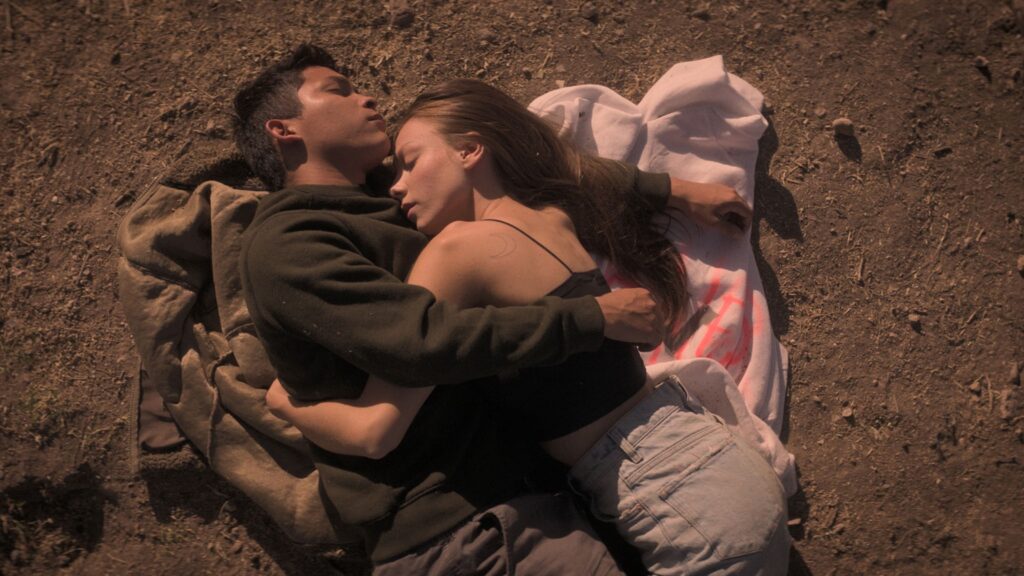
Perdidos En La Noche is best wel zwaar. De eerste scène is meteen een knaller, er gebeuren zoveel dingen en alles gaat mis. Het is alsof je ons in de nachtmerrie plaatst die Mexico volgens mij wel kan zijn, was het de bedoeling om zoveel dingen in het begin te zetten?
Amat: Weet je, zoals in horrorfilms, actiefilms, zijn ook de onderwerpen in drama heel echt en dicht bij de werkelijkheid. Voor mij was het interessant om het publiek mee te nemen in dit conflict en ze te laten springen. Ik heb ook een theorie die zegt dat een film met alles moet beginnen. Op die manier, kun je weggaan als je dat wil. Dus in het begin probeer ik altijd om sterke dingen in te bouwen, als er iets heel bizars gebeurt, dan toon ik dat ook steeds tijdens de eerste beelden.
Toen ik de film zag, deed hij me denken aan La Civil van Teodora Mihai en toen ontdekte ik dat Daniel Garcia Beno in beide films zit….
Amat: Ja, ik denk dat het toeval is. Juan Daniel Garcia Beno die Emiliano speelt is een nieuw gezicht, hij is anders en heeft veel energie. Ik heb die film niet gezien toen ik hem heb gecast. Maar ja, er zijn inderdaad overeenkomsten.
Ken je de achtergrond van La Civil?
Amat: Nee, maar vertel maar.
Oorspronkelijk wilde de regisseur een documentaire maken. Nadat ze zoveel bedreigingen kreeg, moest ze vluchten en besloot ze om een film buiten Mexico te maken. Heb je zelf ooit zulke bedreigingen gekregen?
Amat: Nee. De enige bedreiging die ik kreeg had te maken met de corruptie met het leger. Het is een scène in Italië waarin een buitenlander, een Amerikaan, lokale troepen traint in Italië, in Mexico is dat illegaal. Ik heb een bedreiging ontvangen, ik weet niet meer via welk medium. Ik denk dat het sociale media of een e-mail was. Het kwam van een Amerikaanse beveiligingsspecialist die troepen trainde waar ik woon en dat werd nieuws in Mexico. Zo’n scènes zaten ook in mijn film en die Amerikaan zei me dat ik die scènes uit de film moest halen. Dat is tot nu toe de enige bedreiging die ik heb gekregen en ze komt dan nog uit de Verenigde Staten. Ik krijg geen Mexicaanse bedreigingen omdat ik zeer brede verhalen schets die in zekere zin algemeen zijn. Die dingen gebeuren ook in L.A. Het is al zo vaak gebeurd, op zo veel plaatsen. Het is heel anders voor journalisten, omdat die verslag uitbrengen van specifieke gebeurtenissen en dat is heel wat delicater. Ik beschouw mezelf niet als iemand die daar dicht bij staat.
Elke dag lezen we over corruptie in Rusland en de Verenigde Staten. Maar die uit Latijns-Amerika komt het hier nooit in het nieuws en het voelt bijna aan alsof het gewoon is.
Amat: Ik denk dat het een fenomeen is dat is hoe het nu is in de wereld. Plaatsen die populairder zijn krijgen meer aandacht als er iets gebeurt. En ik denk dat er een zelfgenoegzaamheid is van informatie als het een plek is waar het regelmatig gebeurt. Waarom zou je dan een nieuw geval melden als het toch altijd gebeurt? En het maakt het heel gevaarlijk, want als er niet genoeg nieuws over is, zijn mensen daar vrijer om zo’n dingen te doen. Ik laat in Perdidos En La Noche de oorsprong zien van deze corruptie bij het mijnbedrijf. Ik denk dat bijna 70 of 80% van de mijnbouw in Mexico van buitenlandse bedrijven komt, vooral uit Canada. En ja, ze plegen misschien niet direct misdaden, maar ze gebruiken de wetten om zich daar te vestigen en er materiaal uit te halen. Door de maatschappij en de manier waarop de Mexicaanse wet niet goed werkt, is het makkelijk om er misbruik van te maken en je handen schoon te houden. Het kwaad in de film gebeurt altijd op een manier waarbij mensen hun handen schoon houden. De misdaad is vaak verdeeld door macht. Dit inspireerde de film, maar daarna veranderde er veel en was er de verdwijning van 43 studenten in Mexico. Veel studentenactivisten verdwenen uit twee bussen die op weg waren naar een protest en het was één van de grootste massale verdwijningen in Mexico en het waren geen criminelen. Het waren burgers die probeerden te protesteren tegen iets wat de regering deed. Dus iedereen heeft er een rol in, zelfs op massale schaal, dat is ook hoe de holocaust plaatsvindt. Er is niet één specifiek persoon. Het is verspreid op een manier die langzaam maar zeker gerechtvaardigd wordt. Dat is hoe veel situaties zich voordoen in Mexico en andere landen. Daarom is het soms moeilijk te begrijpen. Hoe kan iemand dat doen? Nou, het is niet zo gemakkelijk omdat het niet één persoon die de grote crimineel of het kwade meesterbrein is. Op die manier is het complexer.
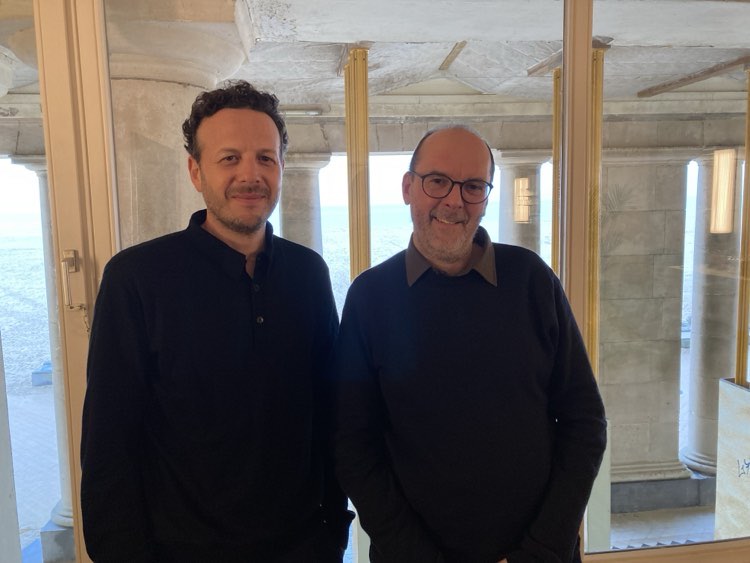
Jouw film is ook een kritiek op het onevenwicht tussen de rijken en de armen. Aan het begin van de film klimt iemand naar omhoog, hij valt te pletter en de rijke familie maakte er een parodie op.
Amat: Ik heb het script samen met mijn broer Martin geschreven en we wilden het zo grappig mogelijk maken zonder overboord te gaan. Ik denk dat je met humor veel leuke extra dingen krijgt. Ik vermaakte me met deze personages en ik maakte ze een beetje extreem omdat het nieuwe personages zijn. Het is mijn vijfde film, maar ik had nog nooit te maken gehad met beroemdheden. Dat was nieuw voor mij en ik denk het gemakkelijk een heleboel dingen geeft die een soort parodie zijn, zoals jij zegt. Als je ze ziet in hun eigen intieme wereld en je zet die af tegen de wereld daarbuiten, dat is de grote tegenstelling die bestaat in Mexico en in veel andere landen. Maar weet je, ik ben geïnspireerd door Mexico, omdat ik daar woon. Het is behoorlijk extreem hoe deze twee werelden daar bestaan en op elkaar inwerken en het normaal wordt.
Je hebt de Netflix-serie Narcos gemaakt en iedereen in de wereld die Netflix heeft, kon die zien. Nu heb je een film gemaakt, maar het is opnieuw veel meer werk voor je om er reclame voor te maken. Is dat niet een beetje frustrerend?
Amat: Narcos was best interessant. Toen het werd uitgebracht, zagen miljoenen mensen het vanaf het eerste moment. Het was behoorlijk, heel gek. Mensen zagen 10 uur van deze serie in twee dagen of misschien zelfs in één dag. En het was een heel contrastrijk fenomeen met mijn films. Helaas zal Perdidos En La Noche niet op die manier zijn. En dat is prima. Dit is een film die je in de bioscoop moet ontdekken. Zo zijn al mijn films tot nu toe geweest. Maar Netflix is ook een nieuwe wereld. Er is een nieuwe manier om dingen te consumeren die anders is. Ik werkte aan drie seizoenen van deze serie die over de hele wereld te zien is geweest. Dat is volgens mij de reden waarom ik nieuwsgierig werd om meer van die roem en van die wereld van mensen te verkennen in Perdidos En La Noche dan in mijn andere films. Ik ontmoette veel van de mensen die uiteindelijk ook in deze film werkten tijdens het maken van Narcos. Er waren dus positieve dingen en ik draaide die serie tijdens de pandemie. Ik kon mijn film zeker een jaar of twee niet opnemen vanwege de pandemie. En het was te duur om de film onder die omstandigheden te regisseren. Maar Netflix kon dat wel doen. Dus ik had een baan en dat hielp me om me te concentreren op Perdidos En La Noche.
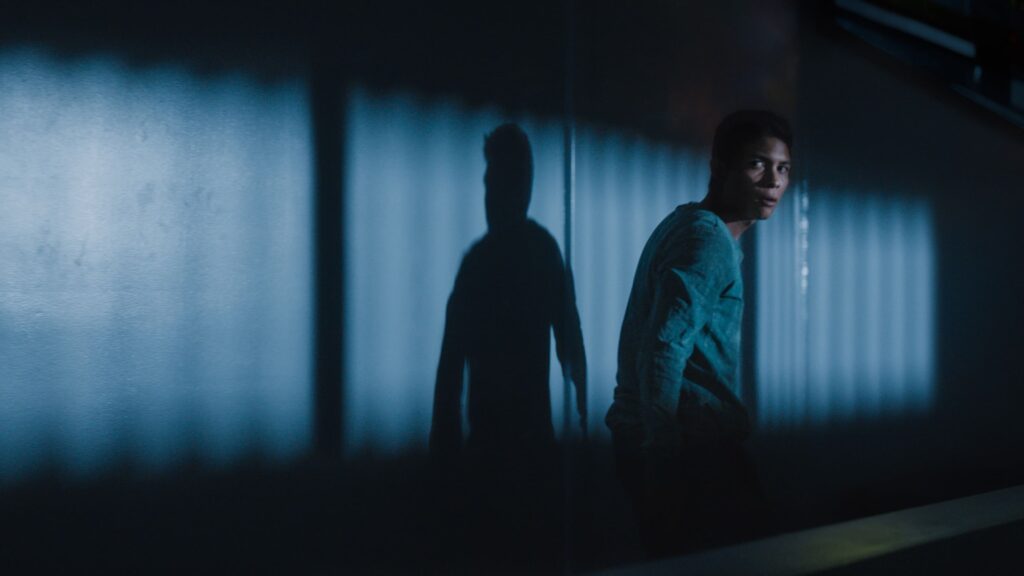
Perdidos En La Noche is de meest toegankelijke film die je hebt gemaakt. Hij zou op Netflix kunnen staan. Het is een film voor iedereen.
Amat: Ik weet niet of ik dat heb geprobeerd. Maar ik wilde dat wel. Het opende de mogelijkheden om te werken met beroemde mensen in Latijns-Amerika en Spanje zoals Barbara Mori en Este Exposito. Ze zijn daar erg beroemd en er is al een vooroordeel over hen waarmee ik speel in de film. Barbara Mori is een ex-soapster en erg populair in Mexico en Latijns-Amerika, net als haar personage dus. Dus het voelde goed aan om haar voor de rol te vragen en ook de dochter is een hele beroemde jonge actrice. Ik gebruik mensen die hier echt waren. Dus ja, ik vond het spannend om die andere ervaring te hebben. We zullen zien hoe het publiek reageert, want dat is moeilijk te voorspellen.
In sommige opzichten dacht ik dat je een hommage aan Sergio Leone bracht, vooral vanwege die rode intermezzo’s.
Amat: Het is niet de eerste keer dat ik deze rode schermen gebruik en ik denk dat het inderdaad uit The Good, The Bad And The Ugly komt. Dat is een film die ik honderden keren heb bekeken toen ik als tiener met films begon. Rood was interessanter dan zwart en het dringt je ogen binnen. Het heeft een heel specifiek emotioneel gevoel. Dus ik probeerde daarmee te experimenteren en te zien wat er gebeurde.
Vraagje om af te ronden. Je favoriete film aller tijden is?
Amat: A Clockwork Orange van Stanley Kubrick. Een andere is The Wizard of Oz. Ik zie er veel dingen in die mijn manier van verhalen vertellen en personages hebben beïnvloed. Ik luisterde zelfs naar de soundtrack van The Wizard of Oz toen ik hierheen liep!
ENGLISH VERSION
First of all, I want to congratulate you with the movie because I was very overwhelmed by it. If I had to describe the movie in one sentence I would say it’s a thriller about a guy who is seeking justice.
Amat: It is the main concept, it would be an interesting exercise to do that myself. But yeah, that’s the basic idea of it. Of course it’s more than that, but that’s the essence I think. And then there’s other things that I think were interesting, personally and socially. Of course, you have the guy’s mother, the guilt and contradictions.
You lived for a time in Mexico. I don’t know if it’s based on real events, but I guess, you know, a lot of guys like Emiliano who are suffering from the same injustice…
Amat: I grew up there in the State of Guanajuato, which is where we shot the film. Yeah, it’s not based directly on a true event, but in my films I always use elements that are happening or are our collective consciousness. And always I try to make it personal in some way. So I try to go into the characters’ life and feel their emotions and contradictions which is very important to make it close to a real situation. Life is very contradictory and it’s never either negative or positive. It’s always this strange thing in between now and the same thing goes evil and good. You know, no person is all evil or all good. So those contradictions are something I like about life in general and I like to be inspired by one place. All my movies have come in a way from the place I was born, even when I go shooting in the United States. Los Basado, my second movie is about people from Guanajuato Mexico. And it’s a place full of stories and different like the whole world actually. And it’s a place that has a lot of things that interest me in my life that have to do with justice and social inequality, those things are very present in a country like Mexico. Sometimes it’s difficult for me to find something else to speak about. And in Perdidos En La Noche I tried to involve other things that I felt curious about, subjects like fame and celebrity. More of the modern type of fame that has to do with the internet and all these things. And still I did it through the pathway that I’ve already been interested in. I guess, it is very real social trying to get non actors that are in the situations that they’re living in. And that was how it was with all the actors, even the real actors in the movie. They happen to be very similar to the characters.
It’s a perfect Hollywood story, of course not in style. But from the very first moment you put the viewer in an uncomfortable position by using a phrase about suicide by Dostoyevsky.
Amat: I usually don’t do this. It’s the first movie where I use a quote about something.
I wrote the screenplay during the pandemic when everybody was stuck at home. Because I live in a small town that has a lot of mountains very nearby. I was able to have a very nice routine of going to the mountains and walking there. And during these trips, I started to listen to the big novels by audio books that I hadn’t listened to in many years because it was very difficult to read. Not these big complicated books. Unfortunately, I’m not that good at reading, but what I did was listen and read at night and listened to most of Dostoyevsky’s novels and I was very inspired by them. I, I don’t think I, I wouldn’t be saying that uh this film is like those, but it happened to be that I was um being inspired and, and writing and making notes while listening to all of his uh thing, all of his, many of his writings, a large amount and it’s very rich and I discovered many of the things that have already inspired me through other films or other artists that have been inspired by him also by Dostoevsky. So I felt comfortable to use phrase that is at the same time kind of ironic. And yeah, I don’t know if it’s exactly irony, but I guess iit’s the feeling of the movie, you know, which is like the darkness about killing yourself. But if you are gonna kill yourself, you might as well take a take and make it worth something, you know? But then at the same time, if you make your life worth something you shouldn’t kill yourself. So that’s kind of funny in that way. Suicide has been something that has been more and more present as I have grown older. You start to see how good friends and people you know commit suicide. So, it’s something new in my life also and it’s something scary and at the same time, very invisible and very abstract and difficult to understand but it has become more present and I think that’s why it’s in the film also.
Well, Perdidos En La Noche is very heavy. The first scene is a blast, so many things are happening, and all the things are going wrong. it’s like you are putting us in the nightmare that Mexico in my opinion can be, was it the intention to put so many things in the beginning?
Amat: You know, like very much uh horror movies, action movies, as well as drama. And yes, the subjects are very real, very close to reality. But at the same time, all of my films are, I tried to go into them from an angle or genre and have cinematically fun. And for me, it was interesting to take the audience right into this conflict and to make them jump is always something that makes me laugh. I also have a theory of starting a film with everything. That way, if you want to leave, you can leave. So, at the beginning, I always try to include strong things, I will also put it at the beginning that something very bizarre happens.
When I watched the movie, it reminded me of La Civil by Teodora Mihai and then I found out that the guy who plays the role also plays in yours. Is that coincidence or not?
Amat: Yeah, I guess it is a coincidence. He’s Juan Daniel Garcia Beno who plays Emiliano. He’s kind of a new face, different and has a lot of energy. I haven’t seen that movie in order to cast him. But, yeah, there are similarities and he’s in it too.
Do you know the background story of La Civil?
Amat: No, tell.
Originally the director wanted to make a documentary. After she had so many threats, she had to flee and decided to make a movie outside Mexico.Have you ever got any threats like that yourself?
Amat: No. The only, the only threat that I got had to do with the corruption with the military. It’s a scene in Italy wherea foreigner, an American that’s training some local forces in Italy. In Mexico it’s illegal for a foreigner to train any type of laws. I did receive a threat, I don’t remember through what medium. I think it was social media or an email. The threat came from an American security specialist who trained some local forces where I live and that became news in Mexico. And then I copied some of the videos that were uncovered and then the real guy, an American said I had to take out those scenes from the movie. So, the only threat that I’ve got is from the United States. I wouldn’t get Mexican threats because um I’m dealing with very broad stories that are in a way generic. Those actual things are happening in L A. It’s happened so many times, in so many places. But then I trust more in the subjects, not in the characters. It would be very different for journalists because they’re reporting on actual specific events and then that’s very different and that’s where it gets very delicate and sad in Mexico. That’s a big problem for journalists to approach this subject. So it’s complicated and I don’t consider myself close to that.
Every day we read about corrupt corruption in Russia and the United States. But in Latin America never cuts in the news over here and it almost feels like that is a common thing over there.
Amat: Well, I mean, I guess it’s a phenomenon that’s how it is in the world now. Places that are more popular or are not known for something, we’ll get more coverage when things happen. And I guess there is a complacency of information coming from a place where it happens regularly. Then why would you report a new one if it always is happening? And I think that’s maybe what happens with countries like Mexico internationally. And, and it makes it very dangerous because when there’s not enough news about it, people are more free to do things there. And actually in Mexico, I show in Perdidos En La Noche the origin of some of this corruption with the mining company. I think nearly 70 or 80% of the mining that happens in Mexico is from foreign companies, Canada mostly. And yeah, they’re not maybe directly committing crimes but they’re using the laws to be able to settle themselves there and extract material. Because of the society and the way Mexican law is not working well, it’s easy to take advantage and keep your hands clean. The evil that happens in the film is always done in a way that people manage to stay clean with their hands. The crime is many times divided by power. This inspired the film, but then it changed a lot and it got left behind with the disappearance of 43 students in Mexico. Many student activists disappeared from two buses that were traveling to do a protest and it was one of the largest mass disappearances in Mexico and it was not between criminals. It was towards civilians that were trying to protest against something of the government did. So everybody has a part in it, even on a mass scale, that’s how the holocaust occurs. There’s not one specific person. It’s spread out in a way that’s slowly justified. That’s how many situations are occurring to me in Mexico and other countries. That’s why it’s difficult to understand sometimes. How can someone do that? Well, it’s, it’s not so easy because sometimes it’s not really that question. There is not one person who is the big criminal or the big evil mastermind. It’s more complex in that way.
Your movie is also a criticism about the rich and the poor. At the beginning of the movie, someone is climbing up. Then he fell and the rich family made a parody of it.
Amat: Well, I wrote the script with my brother Martin and we wanted to make it as funny as possible without going overboard. Because I think with humor, there’s a lot of nice extra things you get. I was having fun with these characters and making them a bit extreme because they are new characters. It’s my fifth movie but I had never dealt with celebrities or artists and their physical beauty as part of their person. So that was new and I think that gives easily a lot of things that are kind of like you say, a parody. But I don’t know if parody would be the exact, funny and extreme that’s what they are. When you see them in their own intimate world and you contrast it with the world outside, that’s the big contradiction that exists in Mexico and in many countries also. But you know, I’m inspired by Mexico, because I live there. That’s pretty extreme the way how these two worlds exist and interact with each other and make it normal. It has become normal.
You made the Netflix series Narcos and everybody in the world who has Netflix who can see it. Now you have made a movie, but it’s a lot of more work for you to advertise it. Isn’t that a bit frustrating? I mean, we now promote your new movie but when it comes to Netflix, you automatically have an audience.
Amat: Narcos was pretty interesting. When it was released millions and millions of people would see it in the first moments.It was pretty, very crazy. People would see 10 hours of this series in two days or maybe a day even. And it was a very contrasting phenomenon with my films. Unfortunately Perdidos En La Noche won’t be in that way. And that’s fine. This is a movie that you have to discover at the cinema. That’s how all of my movies have been so far. But Netflix is also a new world. There’s a new way of consuming things that is different. I was inspired by that not to create something like that. I was working on three seasons of this series that has been seen all over the world. That’s why I think I was also curious to explore more of that fame and of that world of people in Perdidos En La Noche than in my other movies. And I met a lot of the people that ended up working in this film and some actors and some crew I met during the making of Narcos. So there were positive things and I did that series during the pandemic. I couldn’t shoot my movie for at least a year or two because of the pandemic. And it was too expensive to direct it under those conditions. But Netflix was able to do it. So I had a job and that helped me to concentrate on Perdidos En La Noche.
Perdidos En La Noche is the most accesible movie you did. It could be on Netflix. It’s a movie for everybody.
Amat: I don’t know if I tried that. But I did want to, you know, it’s been sometimes frustrating to have my movies exposed. It opened the possibilities of working with famous people in Latin America and Spain like Barbara Mori and Este Exposito. They’re very famous and there’s already a preconceived idea of them that I play with in the film. Barbara Mori is an ex soap opera star and very famous in Mexico and Latin America, and so is her character. So it felt correct to ask her and, and then the daughter is a very famous young actress. I use people that were actually here. So yeah, I was excited to have that different exposure. We will see how the audience reacts as it’s very hard to predict.
In some ways I thought you were paying homage to Sergio Leone, especially because of those red interludes.
Amat: It’s not the first time that I have used these red screens and I think it comes indeed from The Good, The Bad And The Ugly. That was basically a film that I watched hundreds of times when I was a teenager when I got into films. Red was more interesting than black and it invades your eyes. It has a very specific emotional feeling. So I tried to experiment with that and see what happened and I used it and I felt it was OK. So I left it in the film.
Your favorite movie of all time?
Amat: A Clockwork Orange by Stanley Kubrick. Another one is The Wizard of Oz. I can see a lot of the things in there that affected my way of telling stories and characters. I was listening to the soundtrack of The Wizard of Oz when walking towards here!



